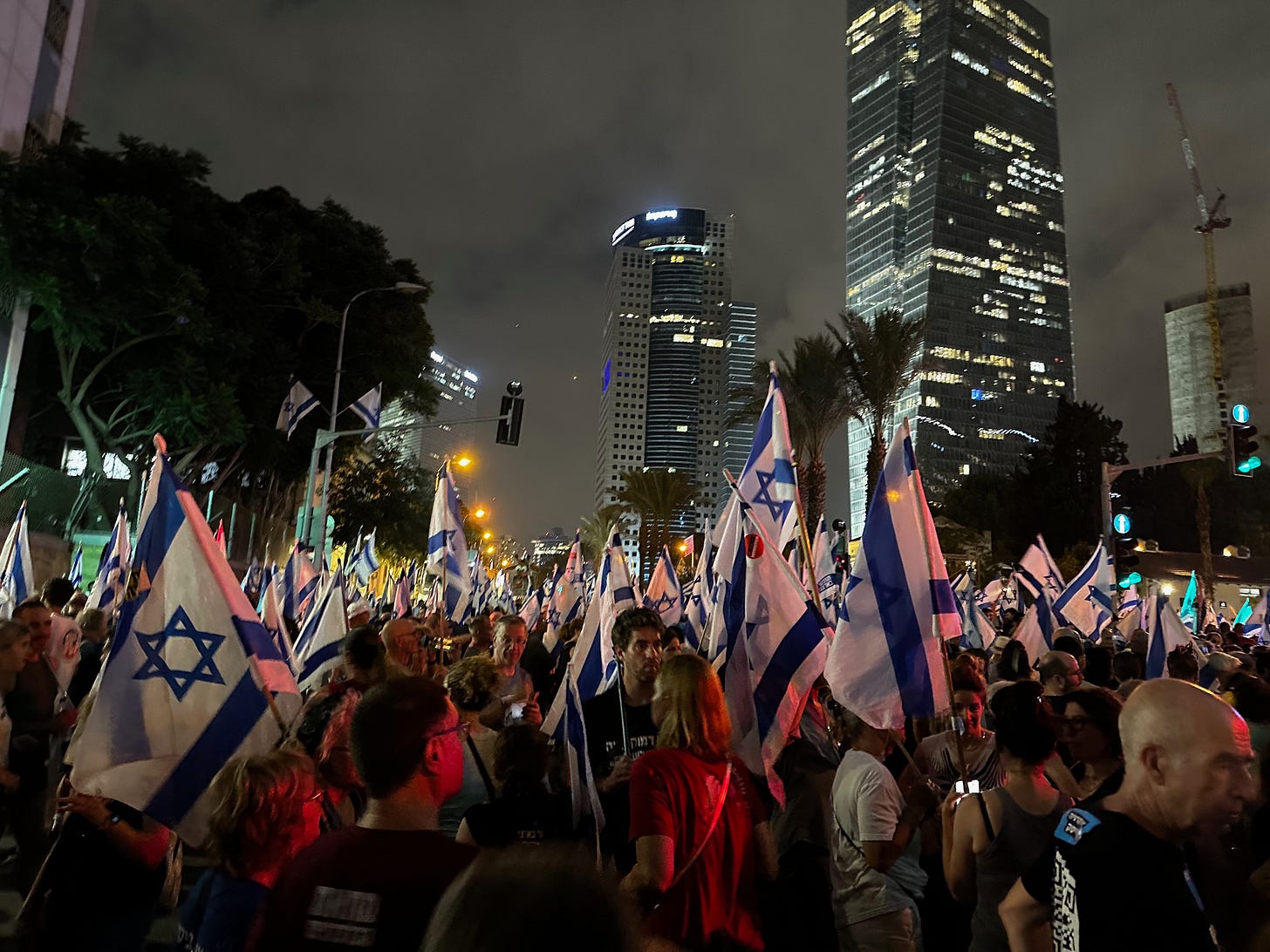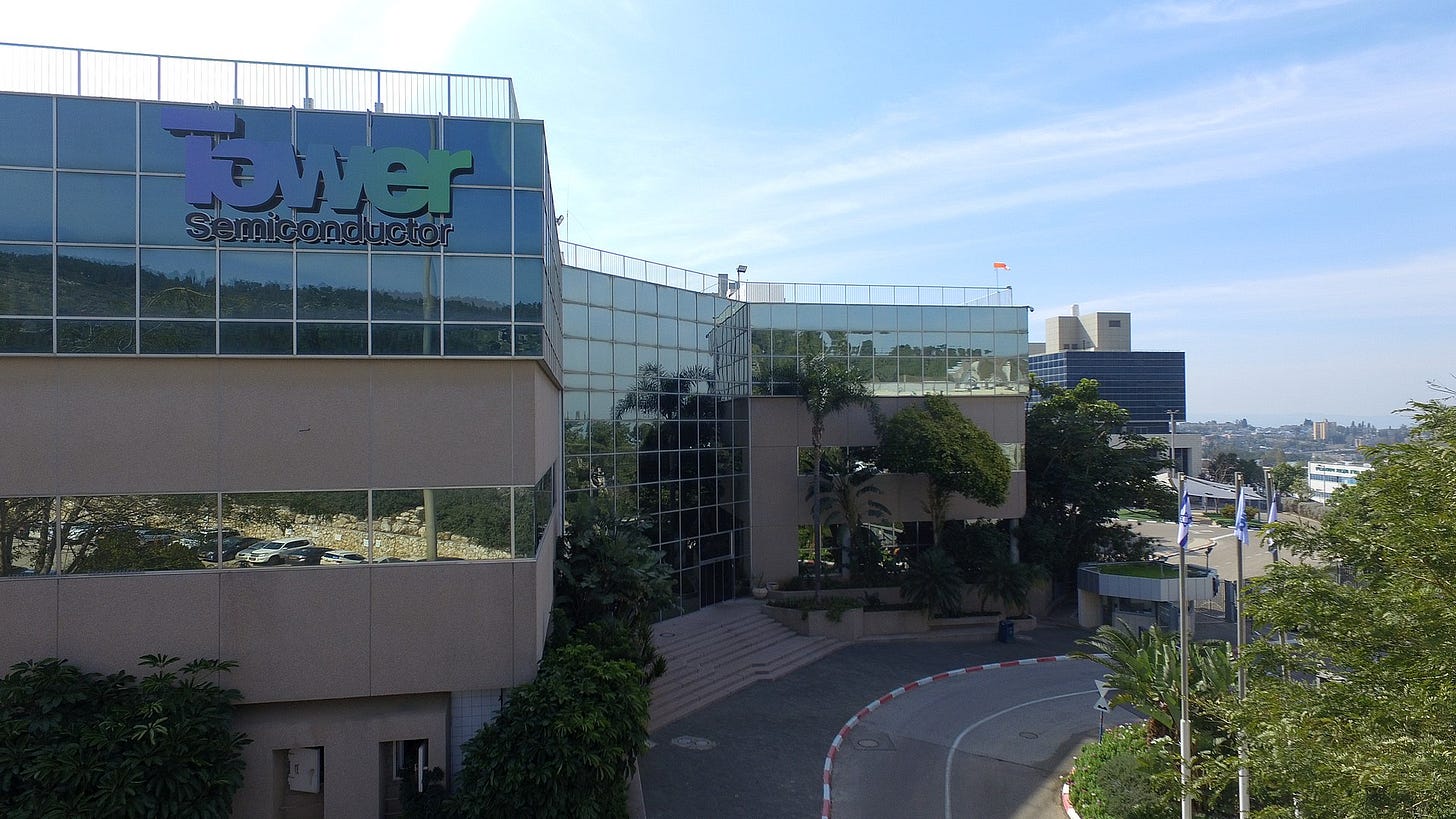Tel Aviv Diary August 18, 2023
Demonstrations Continue,Draft Exemption Bill, Status of the IDF, Light Rail in Tel Aviv Opens, Economy, Business and a Review.
JUDICIAL “REFORM” RAGES ON
While the Knesset is in recess, the debate over judicial reform rages on. This week, beyond the recurring protests, including the weekly Saturday night demonstrations (into week 33) that draw over 100,000 attendees in Tel Aviv alone — and the constant pop-up protests, providing reminders to Netanyahu wherever he goes, the focus of the public outcry has shifted to two main areas, i.e., dissent within the IDF and the threat of a constitutional crisis
.
DISSENT WITHIN IDF RANKS
For the first time in Israel’s history, there's concern about the impact of the current civil divide throughout the ranks of the IDF. The government has been adamant in its stance that the army remains unaffected, or minimally so. However, there is clear evidence suggesting otherwise. The Air Force, which relies heavily on volunteer reservists, appears to be the most affected and is reported to be gradually losing its combat efficiency.
The status of pilot readiness is an evolving condition that could continue to deteriorate. Netanyahu met with senior Army generals this week and was informed on the IDF’s worrisome battle readiness status. The Prime Minister was also urged to stop the barraged of incessant verbal attacks on the IDF leveled by members of his coalition. That plea did not stop his son from publishing a repulsive tweet in which he called the current IDF Chief of Staff “the greatest failure in Israel’s history”
.
There is a real fear that the situation in the IDF could spiral out of control. Netanyahu, who has always prided himself on being nicknamed “Mr. Security,” wholly understands the implications of what is happening to the effectiveness of the IDF, as a direct result of the current political turmoil. Netanyahu could bring an immediate end to this downward spiral by halting the remainder of his coalition’s judicial “reform” proposals. Regrettably, he seems either unwilling or unable to impose this decision on his coalition members.
A LOOMING “CONSTITUTIONAL CRISIS”
Also unprecedented, Israel faces a potential, very real looming threat of a “constitutional crisis” — in the event that the Supreme Court nullifies any of the coalition’s newly-passed laws, and the government chooses to defy the court's decision. When questioned last week, Prime Minister Netanyahu remained ambiguous on this subject. This wee, Israeli media reported that the leaders of all Israel’s security services have “pledged their allegiance to the rule of law”.
On Wednesday, a public disagreement on this matter arose. Police Commissioner Kobi Shabtai asserted: “I state unequivocally —The police's sole compass is the law and its statutes. As long as I command the force, we will act in strict accordance with the law.” This declaration by the “top cop” was immediately countered by the Minister for National Security, Ben-Gvir, who asserted that “the precepts, the law, and the principles of democracy teach that the nation goes to the polls and has its say. Whoever is elected needs to set policy, and everyone must act in accordance with that policy. That's how it is in a democracy. People go to the polls. Politicians are elected and the policies they determine need to lead us all.”
CHAREDIM & DRAFT EXEMPTION (TORAH STUDY LAW)
During the past week, the role of the ultra-Orthodox (Charedim) in Israel has taken center stage in the news and public discourse. Politically, ultra-Orthodox parties continue to insist that the Knesset's first order of business, after the chagim, must be the passage of a law equating Yeshiva study with military service. Passage of this “Torah study law” was promised to them as part of the coalition agreement. However, this would be perhaps the only piece of legislation more controversial than the proposed judicial “reform.”
Netanyahu has been attempting to sway his coalition partners towards a more restrained version of the law, but the ultra-Orthodox parties have thus far refused. While no one anticipates Yeshiva students to abruptly join military combat units like Golani, the majority of Israelis are opposed to legislation that exempts the ultra-Orthodox from any type of military or civil service, especially when non-Charedim are obligated to send their children into potential harm's way.
BROTHERS IN ARMS
The group “Achim LaNeshek” (Brothers in Arms, made up of Army reservists and veterans from every branch of the IDF) vocally opposes both the judicial overhaul, along with any law that would exempt Charedim in perpetuity. In addition to their public campaign, Achim LaNeshek members have tried reaching out directly to the Charedi community, albeit with limited success. A poignant story shared by one of the group's leaders recounted a conversation with an ultra-Orthodox mother of four, describing the experience of having all four children in combat roles. She was moved to tears by the scenario.
It's uncertain how this will unfold and what form the proposed legislation regarding Charedim and service will take. Furthermore, it remains to be seen if all Likud members will support the law. Likud Mks and voters, all of whom serve in the military, as do their children, could deem a permanent exemption for Charedim as a bridge too far. This is a potential pitfall Netanyahu would prefer to sidestep, but it's unclear if the Charedim will allow him that maneuvering space.
CHAREDIM AND WOMAN ON PUBLIC TRANSPORT
This week also saw several reports of women facing discrimination on public transportation due to a clash of religious beliefs. Stories included women denied access to buses by drivers, or if dressed in beachwear, being told to cover up before boarding. A particularly notable incident involved a key correspondent from Channel 13 Neria Kraus, who was asked to change seats on a United Airline flight to accommodate the wishes of an ultra-Orthodox man's who was uncomfortable sitting next to her. When Kraus declined, a flight attendant informed her that the plane wouldn't depart until she complied. While such incidents are not at all new, they have received heightened attention in the current climate, shaped by debates around the judicial overhaul.
THE RED LINE (LIGHT RAIL) OPENS IN TEL AVIV
Today, Tel Aviv celebrated inauguration of the Red Line, the first of three light rail lines planned for the city. Although its construction, which took eight years, concluded both over budget and three years behind schedule, the line now conveniently links Petah Tikvah to the Northeast with Bat Yam to the South. While the rail runs above ground outside Tel Aviv, it operates primarily underground within the city. Businesses along the route have greatly anticipated its completion. While some unfortunately didn't survive the prolonged street closures, those that persevered are now optimistic about a potential boost in business.
It's evident that even with the completion of the subsequent two lines, the light rail will address only a portion of Tel Aviv's transportation needs. As such, efforts have already commenced on a comprehensive subway system for the metropolitan area. Today's official launch marks a significant milestone, realizing a vision that began 50 years ago under Golda Meir's leadership, when work on Israel's inaugural subway began. Now, half a century later, that vision has started to come to fruition, transporting its first passengers today.
ECONOMY
The Central Bureau of Statistics reported that the economic growth for the first half of 2023 was 3.3%, indicating a slowdown from 4.8% in the first half and 3.7% during the second half of 2022. Bank of Israel projects a total growth of 3% for 2023, while the Treasury predicts 2.7%. The high inflation and interest rates may further reduce the growth rate in upcoming quarters.
The five major banks have reported immense profits. They reported a 39% increase in profits with the three five earning NIS 7.5 billion between them. Bank Leumi recorded a 19% return on capital during the period. The huge profits are a direct result of the rise in interest rates allowing the banks to lend out the money of their customers which they pay no interest on to other customers at a high interest rate. More and more Israelis are beginning to put their money into interest bearing accounts, (with NIS 100 billion invested since the beginning of the year). However, Israelis still maintain over NIS 500 billion in non-interest earning checking accounts.
BUSINESS
The US government has approved the sale of the “Chetz 3” anti-ballistic missile system to Germany. The sale, valued at $3.5 billion is the largest arms sale in Israel history. Israel Aircraft Industries (a government company) is the maker of the “Chetz 3” system, which is the only fully operational anti-ballistic missile system in the world. Part of the development of the system was funded by the US, and thus their veto power regarding sales. The irony of Israel the Jewish state providing the weapon that could protect Germany from destruction is worth emphasizing.
The Chinese government has blocked the purchase of Israel’s Tower custom chip manufacturer for $3.5 billion by Intel. Intel will be forced to pay a $450 million fee for the breakup. The Chinese claim they are blocking the purchase due to anti-trust issues. However, that reasoning is a little far fetched— and in fact, Intel and Tower have been caught up in the ongoing dispute between the US and China over semi-conductors. While the breakup is bad for Tower shareholders, I think it is good for Israel. Tower is a national resource. The ability to design and produce advanced custom semiconductors provides Israel with a very important strategic asset
.
Nice Software company reported a profit of $142 million in the second quarter. Sales grew 10%.
Israel Railroads reported a profit of NIS 318 million for the first half of the year.
The changing dynamics in world shipping resulted in Zim going from profits to loss. Operating loss (EBIT) for the second quarter of 2023 was $168 million, compared to their operating income of $1,764 million for the second quarter of 2022, which resulted mainly from the decrease in freight rates. Total revenues were $1.31 billion for the second quarter of 2023, compared to $3.43 billion for the second quarter of 2022.
A PIECE OF HISTORY — EVENTS LEADING UP TO THE SIX DAY WAR PART I
In October and November of 1966, there was an uptick in terrorist activities stemming from Syria and Jordan. Furthermore, Syrian artillery consistently targeted kibbutzim (collective settlements) situated beneath the Golan Heights. In April 1967, Israel retaliated by launching an aerial assault on Syrian positions in the Golan Heights. On April 7, an air battle ensued in which Israel shot down six Syrian aircraft. Subsequent to this incident, the Israeli government cautioned that it would undertake further actions if Syrian-backed terrorism persisted. In response, the Soviets fed the Egyptians false intelligence, alleging that Israel was amassing troops for an assault on Syria. Despite Israeli refutations and confirmations of their innocence by U.N. ground observers, Egypt remained wary
.
By May 14th, while Israel marked its Independence Day, Egypt had its armed forces on high alert and began relocating them to the Sinai. In reaction, Israel initiated a partial call-up of its reserves.
On May 16th, the head of the Egyptian armed forces, General Muhammad Fawzi, penned a letter to the United Nations Emergency Forces Commander, seeking the removal of U.N. forces from the border. Subsequently, on May 18th, Egyptian Foreign Minister Mahmoud Riad asked the U.N. to evacuate all its troops from Egyptian territories, including the Gaza Strip. U.N. Secretary-General U-Thant concurred and proceeded with the withdrawal. In the meantime, Israel intensified its reservist call-up.
A TASTE OF TEL AVIV –
RESTAURANT REVIEW, by Tali Schulman
Flatbush, self-described as Afro-Latin cuisine, takes its name from the avenue where Afro-American and Central American flavors beautifully converge. What truly sets Flatbush apart is that it might be the only establishment in the city offering genuine Caribbean flavors. The menu presents an inviting array of choices, including Arepas, jerk chicken, ceviche, buffalo wings, and mac and cheese, all of which beautifully showcase the diverse cultures and flavors coming together.
A highlight on the menu, and a personal favorite of mine, is the rum cake. This dessert expertly achieves a beautiful balance of flavors and textures, avoiding excessive sweetness. Missing out on this treat would be a culinary mistake—consider making it a priority on your dining agenda
.
For more Tel Aviv restaurant recommendations, you can find me on Instagram @talischulman where I save all my food adventures in my highlights!











I have always said Netanyahu is Israel's biggest problem.